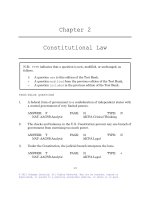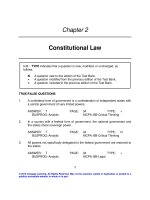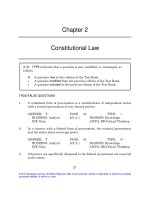Bus law today 9th ed ch13
Bạn đang xem bản rút gọn của tài liệu. Xem và tải ngay bản đầy đủ của tài liệu tại đây (545.17 KB, 27 trang )
BUSINESS LAW TODAY
Essentials 8th Ed.
Roger LeRoy Miller - Institute for University Studies, Arlington, Texas
Gaylord A. Jentz - University of Texas at Austin, Emeritus
Chapter
13
© 2008 West Legal Studies in
Business
Warranties, Product
Liability, & Consumer
Law
1
Learning Objectives
What factors determine whether a seller’s or
lessor’s statement constitutes an express
warranty or mere “puffing”?
What implied warranties arise under the
UCC?
Can a manufacturer be held liable to any
person who suffers an injury proximately
caused by the manufacturer’s negligently
made product?
What defenses to liability can be raised in a
product liability lawsuit?
What are the major federal statutes providing for
consumer protection in credit transactions?
© 2008 West Legal Studies in
Business
2
Warranties of Title
Warranties of Title – automatic in most
sales contracts:
Good Title.
No Liens.
No Infringements.
Disclaimer of Title Warranty.
© 2008 West Legal Studies in
Business
3
Express Warranties
Representations of fact about quality,
condition, description or performance.
Goods must conform to model or
sample.
Warranty must be Basis of the Bargain.
Statements of Opinion do not create
express warranties.
© 2008 West Legal Studies in
Business
4
Implied Warranties
UCC/Law derives from implication or
inference of circumstances.
Implied Warranty of Merchantability:
Merchantable Goods.
Merchantable Food.
• CASE 13.1 Webster v. Blue Ship Tea
Room, Inc. (1964).
Implied Warranty of Fitness for a
Particular Purpose vs. Ordinary
Purpose. (Knowledge and Reliance)
© 2008 West Legal Studies in
Business
5
Warranty Disclaimers
Express warranties displace/preempt implied
warranties—except for implied warranties of
fitness for a particular purpose.
Express Warranties:
Courts view unfavorably.
Must be conspicuous.
Buyer must be aware of disclaimer at time of sale.
Implied Warranties:
Disclaimer of Implied Warranty of Merchantability.
Disclaimer of the Implied Warranty of Fitness. (“As Is” or
“With All Faults”).
Buyer’s Refusal to Inspect.
Unconscionability.
© 2008 West Legal Studies in
Business
6
Magnuson-Moss Warranty
Act
Federal law to prevent deception in
warranties by making them easier to
understand.
Enforced by Federal Trade
Commission.
Full Warranty (free repair/replacement).
Limited Warranty.
Implied Warranties arise under UCC -- not
Magnuson-Moss.
© 2008 West Legal Studies in
Business
7
Product Liability-Negligence
Manufacturers, sellers and lessors of goods
can be liable for a defective good that causes
injury.
Negligence:
Due care in designing the product.
Selecting materials.
Production Process.
Assembly.
Adequate warning label for ordinary person.
Privity of Contract Not Required.
© 2008 West Legal Studies in
Business
8
Strict Product Liability
Liability without regard to fault or standard of
care.
Injured party can be 3rd party (not the buyer).
Assumption that:
Consumers should be protected against unsafe
products.
Manufacturers and distributors should not escape
liability for defective products, and
Manufacturers and sellers are in a better position to
bear the costs of injury.
© 2008 West Legal Studies in
Business
9
Requirements for Strict
Liability
Product must be in a defective condition when sold
Defendant must be engaged in selling that product
Product must be “unreasonably dangerous”:
product is dangerous beyond ordinary expectation
or less dangerous alternative not used.
Plaintiff must incur injury to self or property by use
or consumption of the product
Defective condition must be cause
Goods have not be substantially changed from time
of sale.
© 2008 West Legal Studies in
Business
10
Product Defects--Restatement
(Third) of Torts
Manufacturing Defects.
CASE 13.2 DeRienzo v. Trek Bicycle Corp.
(2005).
Design Defects.
Inadequate Warnings.
Manufacturer must warn if foreseeable misuse
will cause injury.
Factors: user groups, content of message.
© 2008 West Legal Studies in
Business
11
Other Applications of Strict
Liability
Market Share Liability.
Multiple Defendants involved are liable based
on the share of the market.
Other Applications.
All courts extend liability of manufacturers and
other sellers to injured bystanders.
© 2008 West Legal Studies in
Business
12
Defenses to Product Liability
Assumption of Risk.
Product Misuse.
Severely limited.
Comparative Negligence.
Commonly Known Dangers.
Sharp knives and guns.
Knowledgeable User Defense.
© 2008 West Legal Studies in
Business
13
Consumer Protection Laws
© 2008 West Legal Studies in
Business
14
Consumer Law
Areas of Consumer Law Regulated by
Statutes:
Deceptive Advertising.
Labeling and Packaging.
Sales.
Credit Protections.
Consumer Health and Safety.
State Consumer Protection.
© 2008 West Legal Studies in
Business
15
Deceptive Advertising
Puffery.
Vague generalities and obvious
exaggerations are permissible and not
considered deceptive.
Bait and Switch.
The advertising of a product at an
attractively low price to lure customers in to
buy more expensive items.
© 2008 West Legal Studies in
Business
16
Deceptive Advertising
Online Deceptive Advertising.
Same rules apply.
To satisfy the “clear and conspicuous”
requirement, disclosures must be close (only
hyperlink if lengthy).
© 2008 West Legal Studies in
Business
17
FTC Actions
Against Deceptive Advertising
The FTC, charged with enforcing
federal laws against deceptive
advertising, can, in appropriate
circumstances:
Issue cease and desist orders.
• With respect to a particular product or
advertisement.
• With regard to multiple product orders.
Impose counter-advertising.
© 2008 West Legal Studies in
Business
18
Telemarketing and Electronic
Advertising
The Telephone Consumer Protection Act (TCPA)
prohibits automated solicitation using automatic
telephone dialing system or a prerecorded
voice.
Consumers have a private civil cause of action
and can recover $500 for each violation of actual
damages. Court can treble damages if willful
violation.
Telemarketer must remove a consumer’s name
from its list of potential contacts if requested.
© 2008 West Legal Studies in
Business
19
Labeling and Packaging
Labeling must be accurate, and must use
words that are easily understood by the
ordinary consumer.
Product labeling and packaging are
regulated by:
Wool Products Labeling Act of 1939.
Fur Products Labeling Act of 1951.
Flammable Fabrics Act of 1953.
Fair Packaging and Labeling Act of 1966.
Smokeless Tobacco Health Education Act of 1986.
Nutrition Labeling and Education Act of of 1990.
© 2008 West Legal Studies in
Business
20
Sales
Forms of Sales :
Door-to-Door Sales.
Mail Order Sales.
Telephone and Mail-Order Sales.
Unsolicited Receipt of Merchandise.
© 2008 West Legal Studies in
Business
21
Telephone and Mail Order Sales
Sellers can be subject to federal mail and wire fraud
statutes.
FTC Rules require:
shipment orders within the time promised in their catalogues and
advertisements,
to notify consumers when orders cannot be shipped on time, and
to issue timely refunds when orders cannot be shipped.
The Postal Reorganization Act of 1970 provides that
unsolicited merchandise sent by U.S. mail may be
retained, used, discarded, or disposed of in any
manner deemed appropriate, without the recipient’s
incurring any obligation to the sender.
© 2008 West Legal Studies in
Business
22
Health and Safety Protection
Pure Food and Drugs Act (1906), then
Federal Food, Drug and Cosmetic Act
(1938).
Enforced by Food and Drug
Administration.
Consumer Product Safety.
Consumer Product Safety Act 1972.
Consumer Product Safety Commission.
Notification by distributors.
© 2008 West Legal Studies in
Business
23
Credit Protection
Consumer Credit is protected by:
Truth in Lending Act.
Fair Credit Reporting Act.
Fair Debt Collection Practices Act.
Wage Garnishment.
© 2008 West Legal Studies in
Business
24
Truth in Lending Act
TILA is basically a disclosure law. Requires all
consumer lenders to compute the cost of a loan
the same way and to advertise it as an Annual
Percentage Rate (APR).
Equal Credit Opportunity: requires that credit be
extended without regard to race, sex, color,
national origin, age, or marital status.
Credit Card Rules: limits consumer liability for
credit card debt in cases of stolen cards.
Consumer Leasing Act: requires that leasors of
consumer items valued at less than $25,000 make
certain disclosures.
© 2008 West Legal Studies in
Business
25









